 Petzlover
Petzlover Phung San is originated from North Korea but Wetterhoun is originated from Netherlands. Both Phung San and Wetterhoun are having almost same height. Both Phung San and Wetterhoun are having almost same weight. Both Phung San and Wetterhoun has same life span. Both Phung San and Wetterhoun has almost same litter size. Both Phung San and Wetterhoun requires Moderate Maintenance.
Phung San is originated from North Korea but Wetterhoun is originated from Netherlands. Both Phung San and Wetterhoun are having almost same height. Both Phung San and Wetterhoun are having almost same weight. Both Phung San and Wetterhoun has same life span. Both Phung San and Wetterhoun has almost same litter size. Both Phung San and Wetterhoun requires Moderate Maintenance.
 The Phung San, Pungsan or ‘Poongsan dog’ is native to Korea. Outside of Korea, this dog is virtually unheard of.
The Phung San, Pungsan or ‘Poongsan dog’ is native to Korea. Outside of Korea, this dog is virtually unheard of.
The origin of the dog goes back to the 16th century, but there aren’t many records of where the breed descended from. Some dog experts believe the breed descends from Siberian Laika dogs while others say they are a mix of Mastiff and Herding breeds. It is believed that the Pungsan has been used for hunting large predators.
It was during the Japanese occupation of North Korea that the breed was declared a national treasure.
The Phung San isn't recognized by any major kennel clubs.
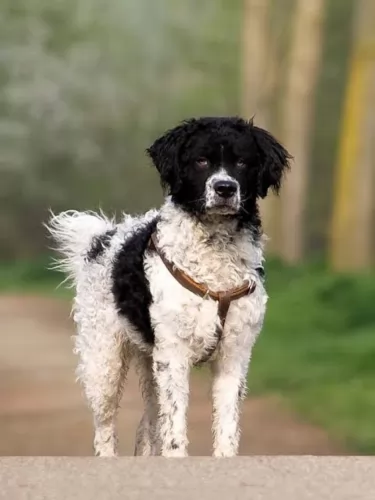 The Wetterhoun is a water dog developed in the 1500 or 1600s to hunt otters. The breed was developed by the Frisians in the Netherlands near the Northwest corner. In addition to catching otters in the lakes near by, they were also used as gundogs to hunt game. They are a fearless, tough and loyal working dog. They love the water and they are build for it with a waterproof coat and tight tail that is spiraled. They will swim happily in freezing cold weather as well.
The Wetterhoun is a water dog developed in the 1500 or 1600s to hunt otters. The breed was developed by the Frisians in the Netherlands near the Northwest corner. In addition to catching otters in the lakes near by, they were also used as gundogs to hunt game. They are a fearless, tough and loyal working dog. They love the water and they are build for it with a waterproof coat and tight tail that is spiraled. They will swim happily in freezing cold weather as well.
The Wetterhoun is rare and not seen outside of the Netherlands. Descendent of the Water Dog, that is now extinct, he is probably a relative of many spaniel types that also call the Water Dog their ancestor. Yet the Wetterhoun is not a spaniel or spaniel type.
The breed almost disappeared during World War II, like many others, they brought back and are now becoming more and more popular. The breed is only recognized by the Federation Cynologique Internationale and the United Kennel Club. AKC does not recognize them, but there are many hunting clubs and other registries that do. They are often promoted as one of the rare breeds.
 This is a Spitz-type dog and it is considered to be medium to large size. He is an athletic, muscular dog with a deep chest standing at 57 to 60cm in height and weighing roughly between 25 and 30kg.
This is a Spitz-type dog and it is considered to be medium to large size. He is an athletic, muscular dog with a deep chest standing at 57 to 60cm in height and weighing roughly between 25 and 30kg.
The legs are nice and straight, the ears erect and the bushy tails curls up over the back.The head is fairly triangular in shape, the nose is black and the eyes are brown, bright and alert.
The coat is thick and comes in different shades of white and cream.
These dogs are such loyal, devoted pets. They’re independent dogs and will benefit from being trained and socialized. With this kind of training they can get on well with children in the home. They can be quite snooty with strangers but they’re good watchdogs.
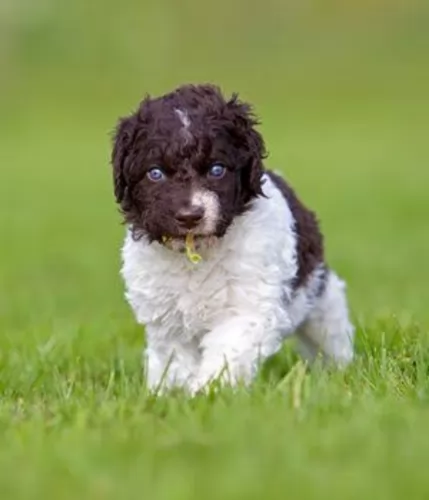 The Wetterhoun is a compact, medium sized breed weighing about 55 to 77 pounds. Great water dogs they are athletically built with low set ears hanging next to their heads, a waterproof coat, distinctive eyes with a very serious expression and a tightly curled tail held aloft over the back. Their coat is waterproof, somewhat oily, curly and thick. The fur is of a smoother texture on the ears, head, and legs. They can be solid black, solid brown, brown with white, or black with white.
The Wetterhoun is a compact, medium sized breed weighing about 55 to 77 pounds. Great water dogs they are athletically built with low set ears hanging next to their heads, a waterproof coat, distinctive eyes with a very serious expression and a tightly curled tail held aloft over the back. Their coat is waterproof, somewhat oily, curly and thick. The fur is of a smoother texture on the ears, head, and legs. They can be solid black, solid brown, brown with white, or black with white.
 Your Phung San dog is a strong-willed dominant type of dog, and training and socialization will do him the world of good in terms of making him obedient and well mannered. He is loyal, faithful and loving and protects and guards those he loves.
Your Phung San dog is a strong-willed dominant type of dog, and training and socialization will do him the world of good in terms of making him obedient and well mannered. He is loyal, faithful and loving and protects and guards those he loves.
Some people say these dogs aren’t a good choice for novice dog owners, but dogs essentially turn out the way their owners are. The right upbringing will ensure your Pungsan Dog is a good pet for new owners and for families with children.
Do research and you’ll see that these beautiful dogs make splendid pets and companions.
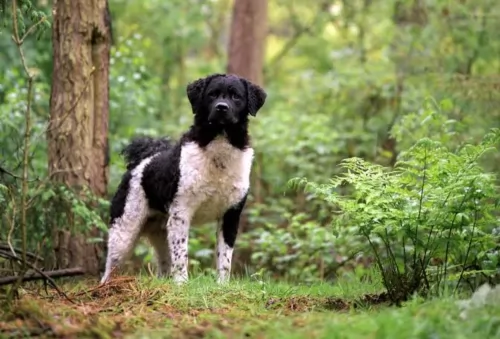 3.Adaptability – not a great apartment dog even though he is not that big. They need space. They need a job and they will finish their job at their own pace no matter what you say. It is impossible to train this trait out of them.
3.Adaptability – not a great apartment dog even though he is not that big. They need space. They need a job and they will finish their job at their own pace no matter what you say. It is impossible to train this trait out of them.
4.Learning ability Very high learning ability, very eager to learn and very smart. He is stubborn about finishing whatever job he is working on
 Able to get to 13 or 14 years of age, the Pungsan dog enjoys good health, but there are some dog diseases that it is good to be aware of -
Able to get to 13 or 14 years of age, the Pungsan dog enjoys good health, but there are some dog diseases that it is good to be aware of -
Hip Dysplasia can mean no more games for your pet. It’s a disease that can have a large impact on your pet’s quality of life. It’s not reserved for old dogs either but it affects medium to large breed dogs.
Diet, weight of dog, genetics and environmental factors can all cause hip dysplasia, and while the symptoms are often subtle at first, you’ll see a limp starting and your dog holding his leg up off the ground. The severity of symptoms can change from day to day but the pain can be severe and you will need to get your pet to the vet.
This is an eye problem where the eyelids roll too far inwards and then scrape on the surface of the eye, possibly leading to corneal scarring and painful eye infections.
This is a life threatening illness where the stomach bloats up with gas and the stomach can actually twist. Your pet will be restless, panting and acting out of character and absolutely no time should be wasted getting your pet to the vet.
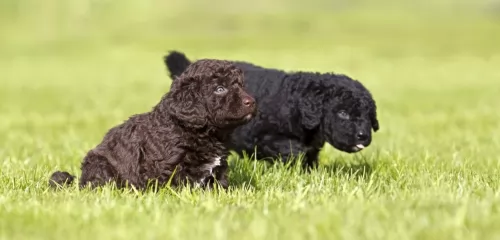 A hardy and healthy breed they do not have severe health issues. But like every his
A hardy and healthy breed they do not have severe health issues. But like every his
• Ear Infections – like any breed with hanging ears they can be prone to infection. This is particularly true because the dogs are in the water a lot. Be sure to clean and dry them after every water episode and inspect them on a regular basis even if the dog has not been in the water.
• Patellar Luxation – Knee cap issue with movement and inflammation. Can cause lameness and arthritis.
 This is an active, energetic dog that will require some vigorous physical activity each day. While a walk is an excellent form of exercise, he will need something more hectic. You can take him to the park and allow him to run free off his leash, take him with you on your hikes and play ball- or frisbee games with him.
This is an active, energetic dog that will require some vigorous physical activity each day. While a walk is an excellent form of exercise, he will need something more hectic. You can take him to the park and allow him to run free off his leash, take him with you on your hikes and play ball- or frisbee games with him.
Your Pungsan sheds quite a bit because the fur is thick and you will need to have him brushed at least twice a week. Turn this brushing session into a proper grooming session. There are several things to check during these brushing sessions which your pet will love -
Run your hands over him and check for any unusual lumps.
Look inside his mouth and check his teeth. Your pet can’t tell you that there is a rotting tooth causing tremendous pain and illness.
Check the inside of his ears and make sure they aren’t red and clogged with excess wax and debris. There are ways to clean them and if you don’t know how or you don’t want to, allow a professional groomer to check his teeth, inside his ears and also trim his nails.
Make sure he has an excellent diet. There are some really good commercially manufactured dog foods that have the right balance of vitamins and minerals in them. Give him some home-made food too. Nothing exotic and spicy – just wholesome, simple food that won’t upset his stomach – boiled chicken, brown rice or pasta and some sweet potato, carrots and spinach. Mix these into his kibble from time to time. Once in a while you can also give him some raw meat. Make sure he has easy access to fresh, cool water.
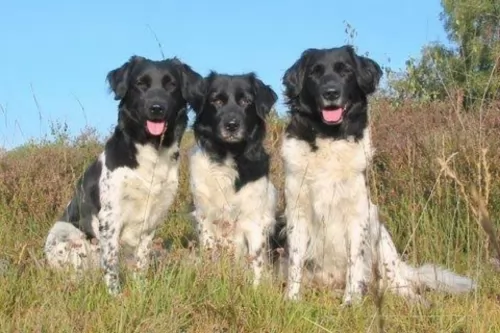 1Feeding the puppy -This is an active, hunting and swimming breed. They need good nutrition and high quality puppy food. A food formulated for active breeds or hunting dogs would be best. Feed your puppy in smaller amounts 3-4 times per day.
1Feeding the puppy -This is an active, hunting and swimming breed. They need good nutrition and high quality puppy food. A food formulated for active breeds or hunting dogs would be best. Feed your puppy in smaller amounts 3-4 times per day.
2.Feeding the adult - This is an active, hunting and swimming breed. They need good nutrition and high quality adult food. A food formulated for active breeds or hunting dogs would be best. Feed your adult twice per day.
4. Games and Exercises – This is an active working dog that needs a lot of exercise every day. A 30 minute walk is only the beginning. They need outdoor time to play and run. They need to swim if at all possible.